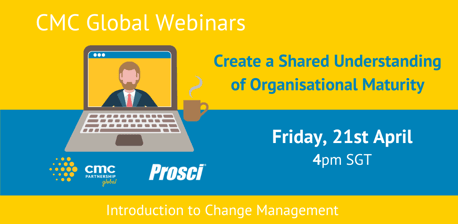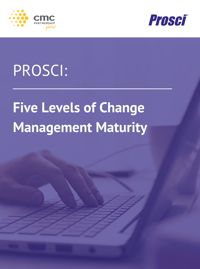With increasingly empowered workforces and constant technological advancements creating an environment where the frequency of demand is on the rise, change has become a part of everyday business. Such developments have made the requirement for a high level of enterprise change management competency essential to increased organisational agility. Building organisational change management capabilities often requires an ongoing process of adoption, ie regular best practice, and as competency builds benefits begin to flow.
Prosci’s Change Management Maturity Model has been developed to help organisations assess change management maturity and set their target for organisational agility improvement. The model is based on research from more than 6,300 projects and assists in the design and deployment of a progressive journey to change maturity throughout all levels of the organisation. Mature organisations enjoy significantly higher rates of change success than those of lower maturity. The maturity model has five levels, from zero change management in use to full change management deployment at all levels in the organisation on all projects. Each level involves more attention and management of the people side of change.
The following 5 levels reveal the predominant characteristics at each stage; with increasing attention and management given to the people side of change.
Level 5: Organisational Competency
Organisation Competency forms the highest maturity level in which change management competency is evident in all levels of the organisation.
At this level, effective change management will be viewed as a priority and an essential component for all projects and initiatives, where executives will have made change management a strategic goal of an organisation. Extensive training is provided company-wide where benefits will not only be seen through profitability and responsiveness, but also through a heightened competitive edge for organisations.
Level 4: Organisational Standards
Level 4 sees the adoption of a unified approach to organisational change management capabilities and company-wide standards have been set for managing and leading change.
This stage is more mature than the below levels, however it is not fully presented as a priority as it does in level 5. The set standards are incorporated into the beginning stages of a project, including the planning phases, and are adapted and tailored for projects being introduced. Organisations with this level of maturity have not yet reached 100% adoption but are in the process of developing these processes and skills, company-wide.
Download: Five Levels of Change Management Maturity
Level 3: Multiple Projects
With a maturity level of 3, popularity of a structured change management approach is growing within the business, however its reach is often limited to particular teams or departments, not the business as a whole.
While there are signs that change management best practice is evident within the organisation, there remains no company-wide approach and methodologies that are being used to implement change amongst teams.
Level 2: Isolated Projects
There are some elements of change management that are visible across certain projects, but change management is inconsistent. Some projects progress up the maturity scale while others will still remain at level 1.
Training remains at a minimum, with managers and leaders receiving little to no training meaning they cannot effectively coach their employees on the change. Oftentimes, change management is applied to a negative event with limited elements of communication and planning. Projects delivered in this level will present a great deal of variation in the approach of change management practices across all different projects, and the application is sporadic.
Level 1: Absent or Ad Hoc
Level 1 is the starting point to change management. An organisation displaying this level of maturity is not aware of change management, and it is perhaps only considered when employee resistance is high and project success is unlikely.
It is common that, in this level of maturity, there are minimal levels of communication surrounding the delivery process of the project, and leaders delivering a project of change often receive little support and sponsorship from executive levels. Those pushing the change initiative are not equipped with the skills and tools to coach their employees through the process.
How can you find out where is your organisation is on its change management journey?

Join us for up-coming free and interactive webinar and discover how to audit your organisation’s current change maturity level and how to use the audit as a baseline to guide efforts and track progress.
You'll also discover the tools, tactics and approaches necessary to increase organisational change maturity.
Don't miss out on this opportunity to put your questions and queries to the experts!
Register today!



